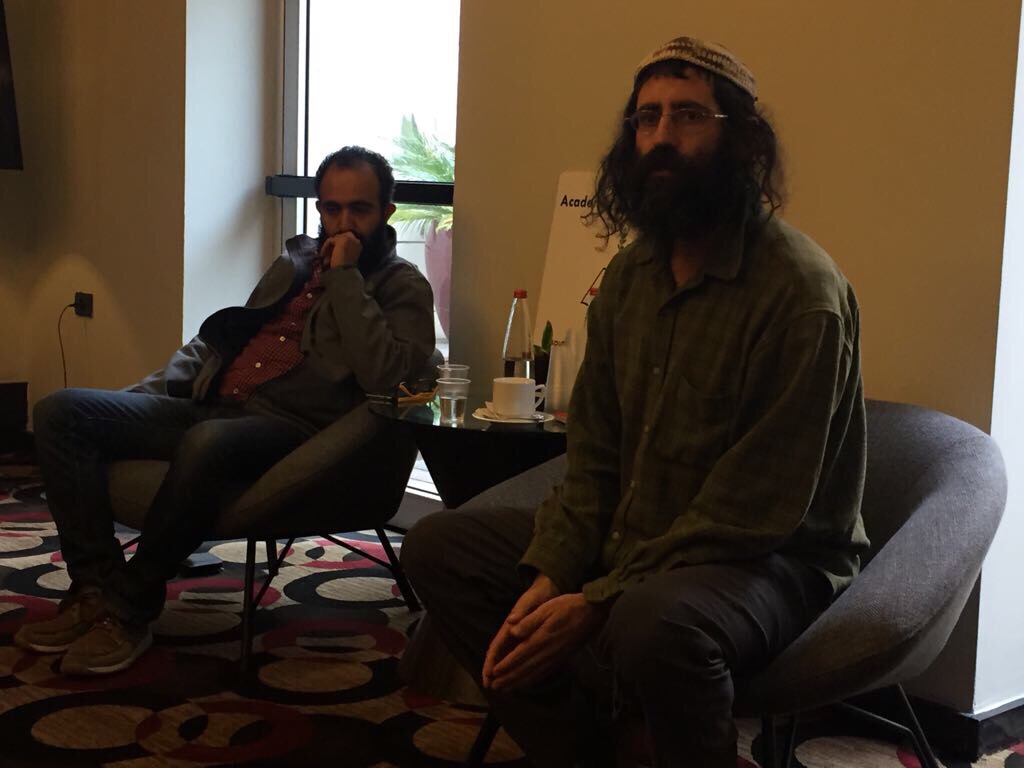After spending almost a full week in Israel learning about the unfathomable complexities of the Israeli-Palestinian conflict, some of us (me included) expressed growing pessimism and even despair about the prospects for peace here. So it was uplifting to start our last full day of the Academic Partners for Peace DR Law Faculty Seminar talking with representatives from Shorashim (“roots”), a group located in the West Bank that is “fostering a grassroots movement of understanding, nonviolence and transformation among Israelis and Palestinians.” Though we originally were scheduled to visit them in the West Bank at their home base, security concerns prevented us from traveling there. Fortunately, Rabbi Shaul Judelman, an Israeli Jew who is a “settler” and lives on a kibbutz in the West Bank, and Antwan Saca, a Christian Palestinian who grew up in Bethlehem in the West Bank, came to our hotel to offer their respective perspectives on the conflict. (Note that Antwan, as a Palestinian, needed special permission from the Palestinian Authority and Israel to travel to West Jerusalem. Luckily for us, he was able to secure that permission overnight.)

They spent an hour with us explaining that the Israeli-Palestinian conflict is not a conflict over a piece of real estate. Rather, it is at its core a conflict over identity, an “us versus them” conflict. Both Israelis and Palestinians are deeply connected to the land of Judea and Sumaria (which makes up today’s West Bank). After all, the word “Jew” means people of Judea. 90% of the stories from the Bible took place in land that now makes up the West Bank. And Arabs – both Muslims and Christians – had been living on the land for centuries under many different ruling empires (most recently the Ottoman Empire and then British colonial rule). For this reason, in the eyes of Shorashim, trading land for peace is not a feasible resolution. This would be asking the people to give up or change their identity. (Forgive me for grossly oversimplifying two millennia of history, but I am trying to convey the basics here, at least as I understand them.)
In addition to identity, fear and anger are also at the heart of the conflict. Though Israelis and Palestinians live very close to each other (the geographic scale of Israel and its borders are tiny), they rarely, if ever, interact with each other. Many Palestinians have never met any Israelis, or talked to them. Rather, they fear each other. As Rabbi Judelman observed, “there are a lot of asymmetries in this conflict, fear is not one of them.” The anger largely stems from each side’s view that the other has delegitimized and dehumanized the other, and the fact that they currently either experience violence in their daily lives or suffer extreme trauma from past violence (or both). Rabbi Judelman calculated that “anger plus fear equals hate.” Finally, many on the ground on both sides believe the politicians have failed them. After all, the Oslo Accords of 1993 only further separated the people and directly led to the two intifadehs (Palestinian uprisings).
In order to resolve the conflict, a group of West Bank-based Israelis and Palestinians realized they needed a new partner for peace. They formed Shorashim to begin the process of bridging an understanding between Israelis and Palestinians and to develop mutual recognition of their respective deep connections to the land. Shorashim create Palestinian-Israeli conversations about identity. They work as “normalizers” — they facilitate contact between the “sides” to show that the two peoples can agree to coexist without agreeing on policies. They “legitimize externally and protect internally.”
Because we were not able to travel to their location, I only got a small taste of the daily work that they do. I would have liked to learn more details about the actual projects, workshops and meetings that they hold. I certainly will read more about that work on its website, www.friendsofroots.net. But, given the dim prospects that peace can be imposed from the top down, I found it inspiring to know that there is work being done from the ground up to work towards peace.

